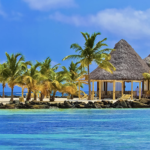The weather in Gibraltar in February is only slightly warmer on average than that of January. While still relatively subtropical and Mediterranean in nature, the weather is a bit cool but thoroughly enjoyable nonetheless.
The average daytime highs that one can expect in Gibraltar in February are 17°C (63°F). The lows at night fall to around 11°C (57°F).
As the winter time is the rainy season, you can expect an average of 7 rainy days in February which is a few less than in January. Total rainfall amounts to around 100 mm or a little less than 4 inches for the month.
Gibraltar averages about 6 ½ hours of sunshine each day in February; of course this will likely be less on those rainy days.
As a general rule, light clothing including long pants, thin coats, and long sleeve shirts are comfortable for this time of year but it's advisable to check current weather conditions prior to your arrival in Gibraltar. If you get here and find that it's a little too chilly for your tastes, there are plenty of clothing outlets that can provide you with suitable apparel for your stay.
There are quite a few historical sites to see while visiting Gibraltar and many of the sites are especially appealing to those who are war history enthusiasts.
Gibraltar has long been held as a high value military asset even dating as far back as Phoenician times. Beginning in the early 18th century, the 'Rock' as it is known was developed as a military strongpoint and has been the site of many siege attempts as one force would fight to take it from another force.
Gibraltar was of especially significant importance during WWII when Winston Churchill decided to expand fortifications that were originally built between 1782 and 1783 by British Royal Engineers in defense from what was known as the 'Great Siege' by France and Spain.
By beefing up the siege tunnels, Churchill was able to dissuade the German forces of Hitler from attempting to occupy the area which would have been disastrous for the Allied forces and would have likely led to a much different outcome to the war.
Today, visitors can take guided tours through these siege tunnels, walking in the footsteps of Churchill and the other great leaders of the era.
























